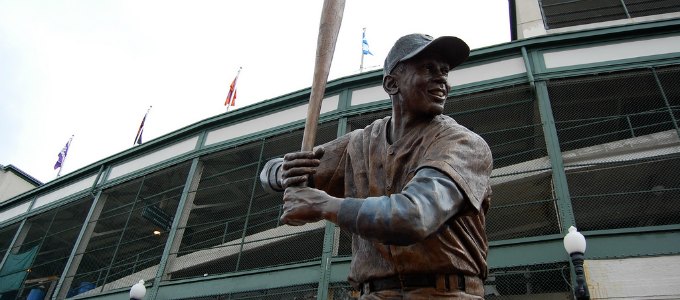Image courtesy of Flickr/picbot
The start of baseball season inspires me.
There’s something about the sound of that first crack of a ball to a bat, the sight of freshly mowed grass as it fans out over the diamond, or the calm scene of fans chirping as the players trot out onto the field under a clear, blue sky.
Baseball, of course, is just a game we watch to pass the time. But for fans of the Chicago Cubs, baseball is much more than a game. It carries a lifetime of meaning. Having failed to win a World Series since 1908, baseball for the Cubs and their fans represents eternal optimism, the idea that if you maintain a can-do attitude and work hard, good things will eventually come.
The standard bearer for eternal optimism in Chicago is and will always be a man whose persistence and faithfulness earned him the title “Mr. Cub.” That man, Ernie Banks, the team’s first African-American player, passed away at the age of 83 on Jan. 23.
To baseball purists, Banks, who played from 1953 to 1971, is remembered as the greatest power-hitting shortstop of the 20th century. A slender man who stood just over 6 feet and weighed 180 pounds, Banks ripped 512 home runs in his career. He was named Major League Baseball’s most valuable player in 1958 and 1959, the first to win the honor in consecutive years. He was an All-Star 11 times and was elected to the Hall of Fame in 1977.
But as a member of a team known fondly as “the lovable losers,” Banks never made the playoffs.
That failure never stopped Banks’ indomitably sunny disposition, which was constantly on display. To quote Sports Illustrated’s Tom Verducci, writing after Banks’ death: “How fitting that Banks played his entire home career in daylight and endorsed cookies made by a company called Sunshine. The guy was a walking dose of vitamin D.”
“Welcome to the friendly confines of Wrigley Field,” Banks would reportedly say during batting practice. “Oh, oh, it’s great to be alive and a Cub on this beautiful sun-kissed afternoon.”
“Let’s play two!”
Now, I never met Banks. I wasn’t alive when he played his first game. I wasn’t alive when he played his last.
But as a kid growing up in Chicago, I couldn’t help but hear the stories, most of which told not of Banks’ impeccable baseball credentials but rather his positive temperament and generous contributions to the Chicago community that extended long after his playing career ended.
In reflecting on Banks’ life, I’m reminded why baseball is so inspiring.
Banks was a fantastic ballplayer. But his real impact wasn’t in the fact that he hit lots of home runs. It was that he used the platform baseball provided him for a greater good. Banks was a leader.
Unlike many leaders of our era who bask in a self-imposed glow of entitlement and ego, Banks was a man of and for the people. The press clippings of his casual encounters with everyday fans outside of Wrigley Field are countless. Many of these interactions took place long after he retired from playing, up until the day he died.
As talent managers look to develop leaders — or even work to improve their own everyday disposition — Banks is worth remembering.
Business leaders are often defined by their exceptional skill, expertise or ability to influence large groups of other skilled individuals. And the examples we use are often people — like Jeff Bezos, Bill Gates or Richard Branson — whose personal characteristics are out of touch to the everyday worker.
Banks’ most admirable leadership quality was never his ability to hit a ball or field a double play. It was his unfailingly sunny outlook and his ability to make the most of even the darkest situations — as was often the case in 19 seasons playing for the woeful Cubs.
That’s why people followed him. That’s a leadership example anyone can follow.
Because it’s a beautiful day, the sun is shining. Let’s play two!
Rest in peace, Mr. Cub.















